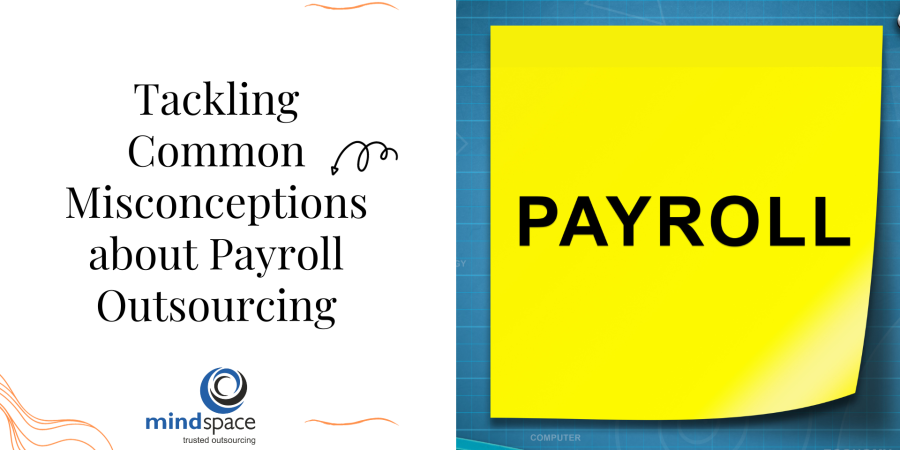Tackling Common Misconceptions about Payroll Outsourcing
Introduction
Payroll outsourcing has become a popular choice for businesses looking to streamline their operations and focus on core competencies. However, despite its widespread adoption, several misconceptions continue to circulate, causing hesitation among business owners. In this blog, we’ll tackle some of the common myths surrounding payroll outsourcing, shedding light on the realities and benefits that this strategic decision can bring to your organization.
Myth 1: Loss of Control
One prevailing misconception about payroll outsourcing is the fear of losing control over critical financial processes. Some business owners worry that handing over payroll responsibilities to a third party means relinquishing decision-making power. In reality, reputable payroll outsourcing providers work as strategic partners, ensuring that you maintain control over key aspects of your payroll while benefiting from their expertise.
When you outsource payroll, you still retain control over parameters such as salary structures, employee classifications, and approval workflows. The outsourcing provider becomes an extension of your team, aligning their processes with your business goals and adhering to your established policies. This collaborative approach ensures that you stay in the driver’s seat, while the outsourcing partner takes care of the day-to-day operational tasks.
Myth 2: One Size Fits All
Another common misconception is the belief that payroll outsourcing services follow a one-size-fits-all approach. In reality, reputable outsourcing providers understand that each business is unique, with its own set of requirements and complexities. They tailor their services to align with your specific needs, ensuring a customized solution that caters to the nuances of your industry, size, and organizational structure.
Whether you’re a small startup or a large enterprise, a good outsourcing partner will offer flexibility in their services, adapting to the evolving needs of your business. This personalized approach not only ensures accuracy in payroll processing but also enables you to scale seamlessly as your organization grows.
Myth 3: Cost Inefficiency
A prevalent myth surrounding payroll outsourcing is the misconception that it is an expensive option. Some businesses believe that the cost of outsourcing exceeds the potential savings in time and resources. However, when you delve into the details, you’ll find that outsourcing can lead to significant cost efficiencies.
In-house payroll management comes with hidden costs, including software licenses, training, and the need for dedicated staff. On the other hand, outsourcing providers operate on economies of scale, spreading their costs across multiple clients. This results in lower overall costs for each client, making payroll outsourcing a cost-effective solution, especially for small and medium-sized enterprises.
Additionally, outsourcing eliminates the risk of costly errors in payroll processing. Mistakes in tax calculations or compliance issues can result in hefty fines and legal consequences. By outsourcing payroll to experts who stay updated on tax regulations and compliance requirements, you mitigate the risk of costly errors, ultimately saving your business money in the long run.
Myth 4: Security Concerns
Security concerns often top the list of reasons why businesses hesitate to outsource their payroll functions. The fear of sensitive employee data falling into the wrong hands can be paralyzing. However, reputable payroll outsourcing providers invest heavily in robust security measures to safeguard your data.
Leading outsourcing firms employ state-of-the-art encryption technologies, secure data centers, and stringent access controls to protect client information. Compliance with industry standards and regulations, such as GDPR and HIPAA, is a priority for these providers. Before partnering with an outsourcing firm, it’s crucial to thoroughly vet their security protocols and certifications to ensure that your data remains confidential and secure.
Myth 5: Complex Implementation
Some businesses shy away from payroll outsourcing due to the perceived complexity of implementation. They fear that transitioning from in-house payroll processes to an outsourced solution will disrupt operations and cause downtime. In reality, a well-planned implementation process can make the transition seamless and minimize any potential disruptions.
Reputable outsourcing providers have experienced implementation teams that work closely with your internal stakeholders to understand your existing processes and design a tailored transition plan. This plan includes comprehensive training for your team, ensuring they are well-equipped to adapt to the new system. With careful planning and open communication, the implementation of payroll outsourcing can be a smooth and efficient process.
Myth 6: Lack of Personalization and Communication
A common misconception is that outsourcing payroll results in a lack of personalization and communication. Some businesses fear that by entrusting payroll responsibilities to an external provider, they will lose the personal touch in managing employee payroll queries and concerns. In reality, reputable outsourcing partners prioritize effective communication and offer personalized support.
Outsourcing providers typically assign dedicated account managers or teams to each client, fostering a direct line of communication. This ensures that your business has a designated point of contact for addressing queries, resolving issues, and receiving timely updates. Additionally, many outsourcing providers offer self-service portals that empower employees to access their payroll information and address routine queries independently, enhancing overall communication efficiency.
Myth 7: Limited Access to Data and Reports
Businesses often worry that outsourcing payroll will limit their access to critical data and reports. However, leading outsourcing providers offer robust reporting tools that provide real-time insights into payroll metrics and compliance. These tools enable businesses to access customized reports, track key performance indicators, and make informed decisions based on accurate and up-to-date information.
By leveraging advanced reporting capabilities, businesses can gain a holistic view of their payroll landscape, identify trends, and proactively address issues. The accessibility of detailed reports also facilitates compliance audits and ensures that your payroll processes align with regulatory requirements.
Conclusion
In conclusion, payroll outsourcing is a strategic decision that can bring numerous benefits to businesses of all sizes. By dispelling common myths and understanding the realities of outsourcing, business owners can make informed decisions that contribute to operational efficiency, cost savings, and overall business success. When approached with careful consideration and a focus on selecting the right outsourcing partner, payroll outsourcing becomes a valuable tool for driving growth and innovation within your organization.


